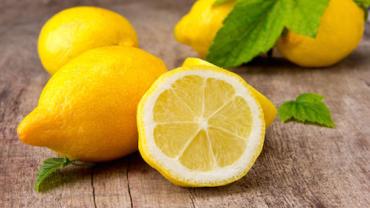
Lemon cultivars can be sweet sour and downright pucker-inducing. In the kitchen they can be used in savory dishes and sweet treats as well as employed as antibacterial cleaning agents. They’re good for digestion too. That’s a lot of work packed into these little yellow fruits!
Like other citrus fruits lemons are high in vitamin C and they also contain small amounts of potassium folate and B6. When consumed along with iron-rich foods vitamin C may help the body absorb more of this mineral. (A good tip for patients who tend toward iron deficiency anemia. Who wouldn’t want lemon garlic lamb kebabs? Or for vegetarians how about fresh squeezed lemon juice on an iron-rich bean salad?)
The acidity of lemons may help aid digestion and their pectin—a soluble fiber—may help reduce total cholesterol as well as improve bowel health. (It should be noted however that lemon juice doesn’t provide fiber. For that the pulp of the fruit must be consumed. A tall order perhaps for people who don’t like the sour taste but grilling lemons is a way to bring out their sweetness. Preserving lemons in salt or with spices is another way to tone down the tartness and bring out the sweet zing while making the pulp very soft and easy to eat—including the rind!)
Lemons are sometimes promoted as a weight loss aid. While squeezing a bit of fresh lemon juice on a salad or even eating the pulp of a lemon isn’t going to put bariatric physicians out of business there’s some evidence that lemons may help just a little in the battle of the bulge. Mouse studies indicate that lemon polyphenols suppress body weight gain and body fat accumulation by “increasing peroxisomal beta-oxidation through up-regulation of the mRNA level of acyl-CoA oxidase in the liver and white adipose tissue.” Lemon polyphenols also improved serum levels of insulin glucose and leptin which may be of benefit to individuals with insulin resistance and/or metabolic syndrome. Additionally adding a splash of lemon juice to water may help individuals drink more of it throughout the day which may translate into slightly greater weight loss owing to the thermogenic effect of water. (Many patients simply don’t like to drink water and a little bit of lemon may make it more appealing.)
Other populations that may benefit from increasing lemon fruit and juice intake are those at risk for kidney stones or those with a history of stones. The high content of citric acid in lemons may help increase urine volume (particularly if added to beverages) and raise urine pH creating an unfavorable environment for stone formation. It also increases urinary citrate excretion with citrate acting as a natural inhibitor of urinary crystallization. “Achieving therapeutic urinary citrate concentration is one clinical target in the medical management of calcium urolithiasis”—and drinking plenty of lemon juice might be one way to boost urinary citrate levels.
Lemon juice is a powerful antimicrobial agent which accounts for the use of lemon essential oil in many household cleaning products particularly those used to clean kitchen counters and cutting boards. Lemon juice has demonstrated antibacterial effects against E. coli Staphylococcus aureus and strains of Salmonella as well as antifungal effects against Candida albicans. Another helpful thing lemons do in the kitchen is keep apples bananas pears and avocados from turning brown when they’re cut prior to adding to a recipe. (Other citrus juice will do this as well such as orange and lime.)
For those who follow a Paleo or lower-carb diet just because sugary lemon shortbread bars are off the menu doesn’t mean there aren’t plenty of other great ways to add more lemon to dinner—and dessert. There’s olive garlic and lemon chicken pan-fried lemon chicken and a super simple lemon vinaigrette—perhaps the easiest way to add lemon other than just squeezing a wedge over a salad or entrée. To indulge a sweet tooth with lemony treats try these gluten and dairy-free recipes for lemon pound cake with honey lemon glaze lemon vanilla meltaways and lemon mousse.